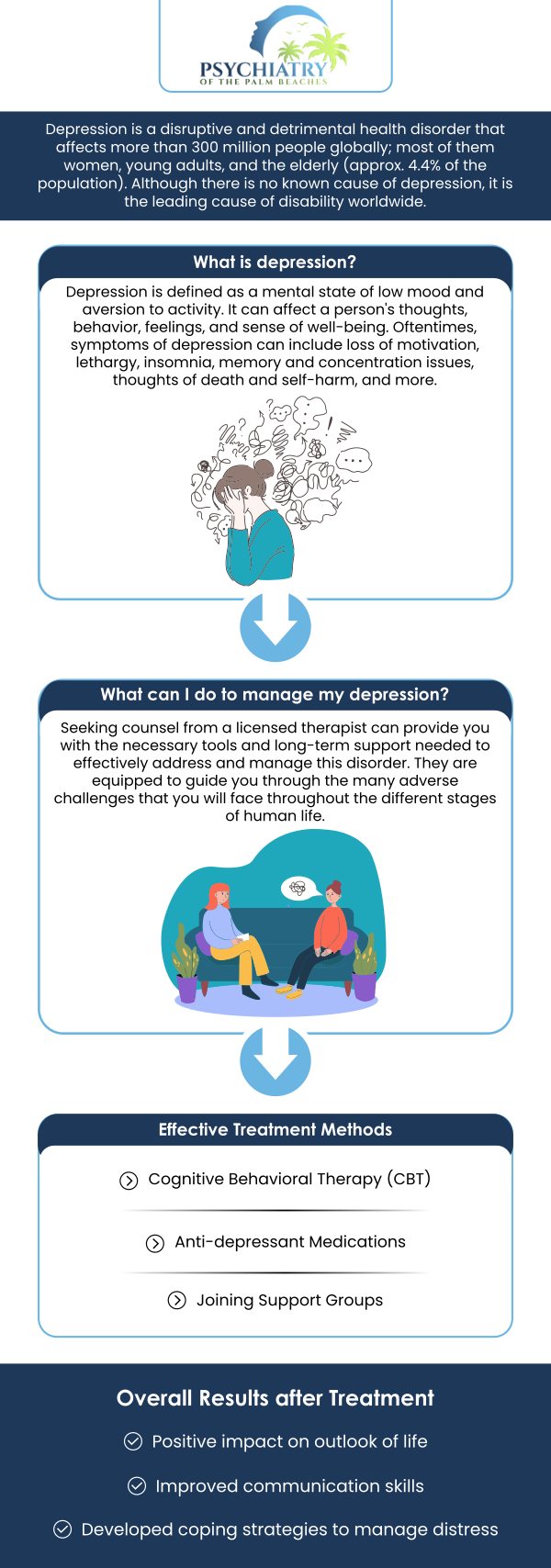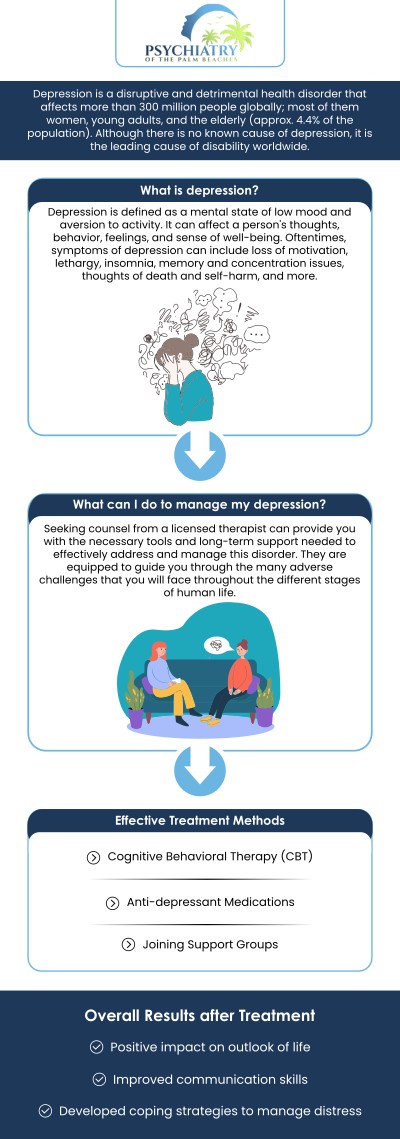Depression and Mood Disorders Treatment Q&A
If you are experiencing symptoms such as pangs of sadness, changes in sleep routine, loss of interest or low self-esteem, you are not used to that are about depression or mood swings that bring you from ups to downs regularly, contact us today to book an appointment to go over what you may be experiencing. We are here to help. Visit Psychiatry of the Palm Beaches serving Jacksonville, Boynton Beach, Palm Beach Garden, Stuart, Royal Palm Beach, Port St. Lucie, Melbourne, Fort Lauderdale, and Jupiter, FL.




Table of Contents:
What are the 5 mood disorders?
What is the difference between a mood disorder and depression?
What are the 4 types of depression?
When should you see a doctor about mood swings?
A mood disorder is considered a mental health class that health professionals use to broadly describe all types of depression and bipolar disorders.
Anyone from children to teens and adults can have mood disorders. However, children and teens generally do not always have the same symptoms as adults, and it can be harder to diagnose mood disorders in children because they are not always able to express how they are feeling.
The most common types of mood disorders are:
• Major depression
Showing less interest in usual activities, feeling upset or hopeless, and other symptoms for at least 2 weeks may indicate depression
• Dysthymia
Chronic, low-grade, depressed, or very irritable moods that can last for up to 2 years
• Bipolar disorder
Show periods of depression that alternate with periods of mania or elevated moods
• Mood disorder related to another condition
Many medical illnesses, including cancer, infections, chronic illnesses, and injuries, can trigger symptoms of depression
• Substance-induced mood disorder
Symptoms of depression are usually due to the effects of medicine, drug abuse, alcoholism, exposure to toxins or other forms of treatment
When you have a mood disorder, your emotional state or mood is distorted or inconsistent with the circumstances and interferes with your ability to function. You may become extremely sad, empty inside, or irritable, and may show periods of depression alternating with periods of happiness (mania).
A few examples of mood disorders include:
• Major depressive disorder
Prolonged periods of extreme sadness
• Bipolar disorder
Manic depression or bipolar affective disorder can include alternating times of depression and mania
• Seasonal affective disorder
This form of depression is often associated with fewer daylight hours in the far northern and southern latitudes, happening from late fall to early spring
• Cyclothymic disorder
A disorder that can cause emotional ups and downs that are less extreme than bipolar disorder
• Premenstrual dysphoric disorder
Mood changes and irritability, which occur around the premenstrual phase of a woman’s cycle and go away with the onset of menses
• Persistent depressive disorder
Long-term form of depression
• Disruptive mood dysregulation disorder
Chronic, severe, and persistent irritability in children, which often includes frequent temper outbursts that are inconsistent with the child’s developmental age
• Depression related to medical illness
Persistent depressed mood and significant loss of pleasure in most or all activities that are directly related to the physical effects of another medical condition
• Depression induced by substance use or medication
Depressive symptoms that develop during or soon after substance use like drugs or alcohol or withdrawal or after exposure to a medication
While there are more than 4 main types of depression, these 4 are some of the most major types we see. They include:
• Situational Depression
This is completely normal to feel, as sadness for extended periods can be brought on by a multitude of negative events and isolating situations. However, this type usually goes away after a few weeks.
• Biological Depression
A person’s depressive symptoms start with the imbalance of any of the neurotransmitters or hormones that can affect our moods and physiology.
• Psychological Depression
This is linked to psychological factors like losing perspective, unrealistic expectations, and negative self-talk.
• Existential Depression
This is triggered usually by a positive event
Usually, individuals do not simply suffer from one of the depression types listed above, but a combination of them. However, our trained psychiatrist at Psychiatry of the Palm Beaches can help diagnose and treat your depression.
Mood swings can be brought on by a few different causes, including:
• Acute stress
• Adolescence and hormonal changes
• Disappointment
• Frustration
• Grief
• Hunger
• Low blood sugar
• Menopause
• Menstrual cycle
Mood swings should be evaluated by a medical professional or a mental health provider when they involve violence or start to interfere with a person’s ability to perform daily tasks and living requirements and make it impossible to concentrate on a task or enjoy life.
Our Team’s Expert Approach to Treating Depression and Mood Disorders
Our team brings a thoughtful, clinically grounded approach to managing depression and mood disorders at Psychiatry of the Palm Beaches. With tailored treatment plans that may include therapy, medication, or advanced interventions, he helps patients achieve lasting mood stability and renewed well-being.
If you think you or someone you love may have depression or mood disorders, Contact us today to schedule an appointment. We have convenient locations to serve you. We are available to go over the testing methods we offer, and when a diagnosis is found, we can also offer treatment options specialized for you. We have convenient locations to serve you. We serve patients from Citrus Ridge FL, Jacksonville FL, Riverside FL, Boynton Beach FL, Delray Beach FL, Palm Beach Gardens FL, Jupiter FL, Stuart FL, Palm City FL, Royal Palm Beach FL, Wellington FL, Port St. Lucie FL, Beau Rivage West FL, Melbourne FL, Palm Bay FL, Fort Lauderdale FL, Hollywood FL, Jupiter FL, North Palm Beach FL, and surrounding areas.
Check Out Our 5 Star Reviews



Additional Services You May Need
▸ Mental Wellness
▸ Relationship Coaching
▸ Depression and Mood Disorders
▸ Women’s Health
▸ Panic Disorder
▸ Medications Management
▸ Men’s Health
▸ Individual Psychotherapy
▸ Bipolar
▸ ADHD
▸ Geriatric Mental Health
▸ Couple’s Counseling
▸ Obsessive Compulsive Disorder
▸ Social Phobia Treatment
▸ Eating Disorders
▸ Post Traumatic Stress Disorder
▸ Psychotic Disorders


